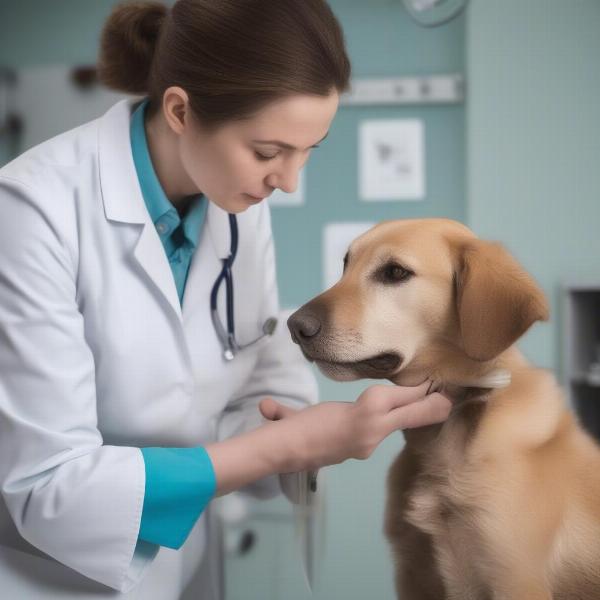Dogs joints cracking, also known as crepitus, is a common occurrence that many dog owners observe. It can range from a subtle click to a more audible pop or grinding sound. While not always a cause for concern, understanding the reasons behind these noises can help you determine when it’s simply a normal bodily function and when it warrants a trip to the veterinarian. This article explores the various reasons why your dog’s joints might be cracking and provides guidance on when to seek professional help.
Why Do My Dog’s Joints Crack?
Several factors can contribute to cracking sounds in your dog’s joints. Sometimes, it’s as simple as gas bubbles forming and releasing within the joint fluid, similar to the “popping” sound you might hear in your own knuckles. This is typically harmless. However, in other cases, the cracking can be a sign of more serious underlying issues.
Age-Related Changes
As dogs age, the cartilage that cushions their joints can wear down, leading to osteoarthritis. This degenerative joint disease can cause inflammation, pain, and stiffness, and the cracking sounds you hear may be a result of bone rubbing against bone.
Developmental Issues
In puppies and younger dogs, joint cracking can sometimes be attributed to developmental orthopedic diseases like hip or elbow dysplasia. These conditions can cause abnormal joint formation and lead to cracking or popping sounds, particularly during movement.
Injuries
Trauma to a joint, such as a ligament tear or fracture, can also result in cracking sounds. If the cracking is accompanied by swelling, limping, or pain, it’s crucial to consult a veterinarian immediately.
Other Causes
Other potential causes of joint cracking include infections, autoimmune diseases, and certain types of cancer. While less common, these conditions can cause joint inflammation and pain, leading to audible cracking.
When Should I Worry About My Dog’s Joints Cracking?
While occasional, painless joint cracking is often nothing to worry about, it’s important to be vigilant for any accompanying symptoms that might indicate a more serious problem.
Signs to Watch For:
- Pain or discomfort: If your dog shows signs of pain, such as yelping, whimpering, or avoiding certain movements, it’s crucial to seek veterinary attention.
- Limping or lameness: Changes in gait, such as limping or favoring one leg, are clear indicators of a potential joint issue.
- Swelling or redness: Inflammation around the joint can be a sign of injury or infection.
- Stiffness or decreased mobility: If your dog seems stiff, struggles to get up, or has difficulty moving around, it’s time to visit the vet.
- Changes in behavior: Lethargy, decreased appetite, and reluctance to play can sometimes be associated with joint pain.
How Can I Help My Dog’s Joint Health?
Maintaining a healthy weight for your dog is crucial for joint health, as excess weight puts added stress on their joints. Regular exercise, including low-impact activities like swimming and walking, can help strengthen muscles and support joint function. Providing a balanced diet rich in omega-3 fatty acids can also help reduce inflammation and support cartilage health. dog paw cushion can also provide additional comfort and support, especially for older dogs.
What Can a Veterinarian Do?
A veterinarian can diagnose the cause of your dog’s joint cracking and recommend appropriate treatment options. This might include pain medications, anti-inflammatory drugs, joint supplements, physical therapy, or even surgery in more severe cases.  Veterinary Joint Checkup
Veterinary Joint Checkup
Conclusion
Dogs joints cracking can be a normal occurrence or a sign of an underlying condition. By paying close attention to your dog’s behavior and any accompanying symptoms, you can help ensure their joint health and well-being. Don’t hesitate to contact your veterinarian if you have any concerns. Early diagnosis and treatment can significantly improve your dog’s quality of life.
FAQ
- Is it normal for my dog’s joints to crack? Occasional, painless cracking is often normal. However, persistent cracking accompanied by other symptoms should be checked by a vet.
- What does arthritis in dogs sound like? It can sound like clicking, popping, grinding, or grating.
- Can diet affect joint health in dogs? Yes, a balanced diet and maintaining a healthy weight are essential for joint health.
- What are some signs of joint pain in dogs? Limping, stiffness, swelling, reluctance to move, and changes in behavior can indicate joint pain.
- How can I prevent joint problems in my dog? Maintaining a healthy weight, providing regular exercise, and feeding a balanced diet are key to preventing joint problems.
- What are some common joint supplements for dogs? Glucosamine, chondroitin, and omega-3 fatty acids are common joint supplements.
- What should I do if I hear my dog’s joints clicking? Monitor your dog for other symptoms and consult your veterinarian if you have any concerns.
Related Articles on ILM Dog
ILM Dog is your one-stop resource for all things dog-related. We offer expert advice on dog breeds, health, training, nutrition, grooming, and much more. We provide valuable resources to help you provide the best possible care for your canine companion. Whether you’re a seasoned dog owner or just starting your journey, ILM Dog is dedicated to empowering you with the knowledge and resources you need. For expert advice tailored to your dog’s needs, contact us at [email protected] or call us at +44 20-3965-8624. ILM Dog is here to help you navigate the world of dog ownership.